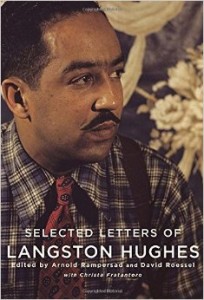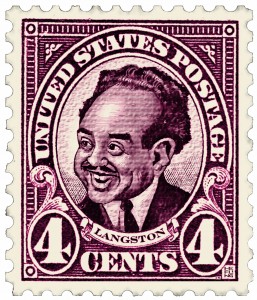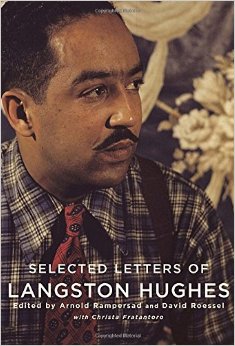 Selected Letters of Langston Hughes
Selected Letters of Langston Hughes
Edited by Arnold Rampersad and David Roessel
Alfred A. Knopf. 480 pages, $35.
A POET from adolescence, James Langston Hughes was determined to earn his living by writing. As a black man who met with racism on a daily basis, he was drawn to radical socialism—and was eventually called to testify at the infamous McCarthy hearings. In addition, he was probably gay. In the face of these and other challenges, Hughes persisted, publishing more than a dozen books of poetry and twice that number of novels, biographies, histories, essays, and short story collections for adults and young people. He was a playwright, librettist, and translator, and he received the Spingarn Medal from the NAACP for outstanding achievement. And over the course of a complex, demanding life he wrote thousands of letters.
Stanford Professor Emeritus Arnold Rampersad and Professor David Roessel of Stockton College in New Jersey have culled over 250 letters from the poet’s archive at Yale. The letters begin in 1921, when Hughes entered Columbia (he left a year later, graduating in 1929 from Lincoln University, where Thurgood Marshall was a classmate), and end just before his death in 1967. The goal was to create “an epistolary companion” to the poet’s life, Rampersad says, and the letters are organized by decade. Photos and page notes complete a picture of the people, places, and events mentioned in the letters.
Born in Joplin, Missouri, in 1902, Hughes grew up in Kansas, Illinois, and Ohio. His racially mixed ancestry included two white great-grandfathers who owned and traded slaves, and a black grandfather who was an abolitionist and educator. His father, who had a law degree, relocated to Mexico when he couldn’t find work. Hughes’ mother remarried, but she moved often, and the poet was raised largely by his grandmother.
 The absence of parents left Hughes with indelible feelings of desolation and a fear of poverty. As seen in Selected Letters, he was, like his mother, drawn to the theater, and he wrote many plays. Like his father, he was businesslike, writing letters to publishers and lawyers in clear, specific prose. Above all, he aimed to be a voice for his fellow black Americans, a goal that he largely achieved, though not quickly and not without difficulty.
The absence of parents left Hughes with indelible feelings of desolation and a fear of poverty. As seen in Selected Letters, he was, like his mother, drawn to the theater, and he wrote many plays. Like his father, he was businesslike, writing letters to publishers and lawyers in clear, specific prose. Above all, he aimed to be a voice for his fellow black Americans, a goal that he largely achieved, though not quickly and not without difficulty.
The 1920s were infused with the energy of the literary movement that would become known as the Harlem Renaissance. Diversity was in style—up to a point. Selected Letters shows Hughes writing with enthusiasm to other young black authors, such as Countee Cullen, Wallace Thurman, Harold Jackman, and Claude McKay, as well as to older mentors like Carl Van Vechten and Alain Locke, who found him patrons.
By 1927, Hughes had published two books of poems and embarked on the first of many tours through the South, reading at black colleges for minimal fees. Racism was still abundantly evident, and the poet’s 1930 letter to McKay exudes outrage: “Fisk University has a new library. At least a nigger a week is being lynched in the South this season, the color line is getting tighter and tighter, even in New York, but in books and the theatre the Negro is still muy simpatico. Dance, damn you, dance! You’re awfully strange and amusing!” That year saw twenty lynchings of black men in the U.S.
The notorious Scottsboro case of 1931 galvanized Hughes. Nine black youths riding a train through rural Alabama were falsely accused of raping two white women, arrested, tried, and found guilty. Selected Letters quotes from the poem, “Christ in Alabama,” which shows his clear anger, beginning with, “Christ is a nigger,/ Beaten and black:/ Oh, bare your back!” Hughes set out to raise funds for the Scottsboro youths’ defense, writing to Cullen for help with the “intensive campaign.”
Hughes supported the Allied effort in World War II while recognizing the irony of Americans’ opposition to Hitler coupled with their tolerance of racism. He wrote an essay for radio broadcast that applied Roosevelt’s “four freedoms” to the cause of desegregation, but Selected Letters notes that the essay was deemed “too controversial” for airing.
Tours and publications brought in little money, and Hughes was usually broke. A rare windfall came in 1947, payment for a libretto he wrote to accompany Kurt Weill’s opera, Street Scene. He used the funds to buy a brownstone in Harlem and moved there with Toy and Emerson Harper, old friends who treated him like a son. Hughes also started a newspaper column for the Chicago Defender around the character of Jesse B. Semple, or “Simple,” a comic, urban black Everyman who mused in ordinary language about topics of the day. The wildly popular columns became a book-length collection, Simple Speaks His Mind. In a 1951 letter to his literary agent Maxim Lieber, the poet exultantly describes a play he has just written, “Simply Heavenly,” as well as plans for a trilogy, “The Saga of Simple.”
The poet’s joy at reaching a national audience was cut short by a summons in March, 1953, to appear before the House Un-American Activities Committee. Writing to Claude Barnett, founder of the Associated Negro Press, which syndicated his Simple columns, Hughes offers explanations and a transcript. A letter to Frank Reeves, his lawyer, overflows with gratitude. Hughes stayed at Reeves’ Washington, D.C., home while testifying. The ever-frugal writer inquires about a raincoat he is sure was left in his host’s closet. “Please put it in a manila envelope or parcel and post it to me,” he says.
Similar mundane details are plentiful in the Selected Letters. Readers looking for new insights on the subject of Hughes’ sexuality will be disappointed. In the introduction, Rampersad firmly states that Hughes “never revealed anything of such an intimate nature in the letters that have survived,” and nothing in this collection directly contradicts that assertion.
And yet. Many of Hughes’ friends—Countee Cullen, Harold Jackman, Claude McKay, Alain Locke, Carl Van Vechten, and others—were gay, and even in Selected Letters intimations abound. For example, working aboard a freighter bound for Africa in 1923, Hughes writes to Locke that his shipmates are “fellows you can touch and know and be friends with.” To Cullen he describes cargo boats loading off the Nigerian coast, with “oars-men themselves gorgeously naked save for a wisp of loin cloth.” In a letter to Van Vechten from Uzbekistan in the 1930s, he quips, “I talked with one of former Emir’s three hundred wives. He had forty boys, too, and when he went away he took the boys and left the wives!”
As Selected Letters notes, by the late 1950s Hughes was focused on legacy, industriously boxing up papers for Yale and redoubling his efforts to aid upcoming black writers. Writing to Richard Wright, he pronounces Native Son “a tremendous performance.” To James Baldwin he sends newspaper clippings about the latter’s novel, Go Tell It On the Mountain and, although he disliked the book, writes a positive jacket blurb. In 1966 Hughes accepted a story from 22-year-old Alice Walker for an anthology he was compiling. “She is really ‘cute as a button’ and real bright,” he writes to Arna Bontemps.
One year later, with renovations scheduled for his now deteriorating Harlem house, Hughes himself underwent prostate surgery—and succumbed to infections a few weeks later. Just before the operation, he had written the letter to Bontemps that closes this collection. He sounds alive with possibilities, ready to travel to Europe and eager to launch a new French version of the celebrated Simple stories. Selected Letters has assembled a finely textured account of this beloved, productive writer who stayed connected with everyone but kept his own counsel and, in the face of daunting obstacles, endured.
Rosemary Booth is a writer and photographer living in Cambridge, Massachusetts.







Discussion1 Comment
“he was probably gay”.
No proof, given. No citations. No anecdotes.
Just a claim.
I say he wasn’t.
Who’s right?